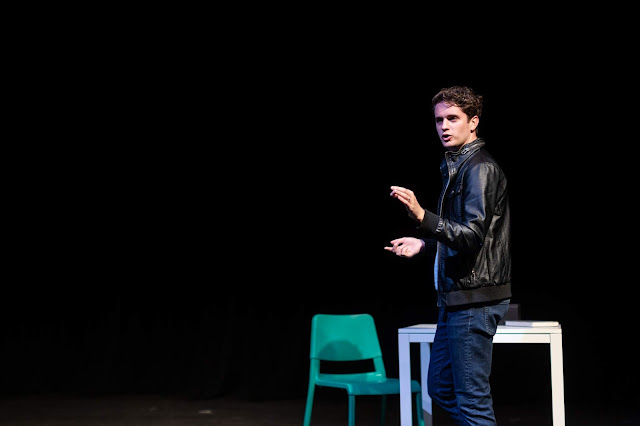Review: In "A Southern Fairytale," Our Hero Makes It Out Ok But Reminds Us That Many Do Not
A Southern Fairytale
Written and performed by Ty Autry
Directed by David L. Carson
Presented at The Kraine Theater
85 E. 4th St., First Floor, Manhattan, NYC
Wed., February 19 at 7:10pm; Sat., February 22 at 5:00pm; Sat., February 29 at 5:00pm; Wed., March 4 at 7:10pm; Fri., March 6 at 5:30pm
 |
| Ty Autry. Photo by Mike Glatzer Photography |
As the play opens, Autry sits alone on the stage and tells us his story from the first inklings of same-sex attraction to battling family, church administrators, and kids at school about his homosexuality. Autry takes on the name Alex Belmont and frames his story as a fairytale. Each act of the play is broken into sections that match one part of a fairytale narrative structure. The stage is simple: a chair, a table with a book, and a small screen that announces each act of the play, which uses fairytale iconography to signal what part of the analogous narrative of Belmont’s life is being narrated. The narrative does not stick strictly to the fairytale analogy, though, as Belmont’s story seems more psychological horror than fairytale through much of it.
 |
| Ty Autry. Photo by Mike Glatzer Photography |
As someone whose own childhood mirrors Belmont’s, the story is sobering at times and makes you realize the thousands of kids who will have to go through the same thing. There is a bit too much leaning into the Southern stereotypes for an NYC audience to laugh at, but that does not overshadow the importance of Autry’s narrative about a kid who just wants to thrive and be accepted not only for who he is but also for what he can become. Belmont/Autry makes it out ok, so it seems. But I could not help but think as I sat there how many kids were currently sitting under the evil gaze of some pastor telling them that “this is just a phase.”
-Joseph Donica
FRIGID 2020 Reviews on Thinking Theater NYC
Other FRIGID 2020 listings on Thinking Theater NYC



Comments
Post a Comment